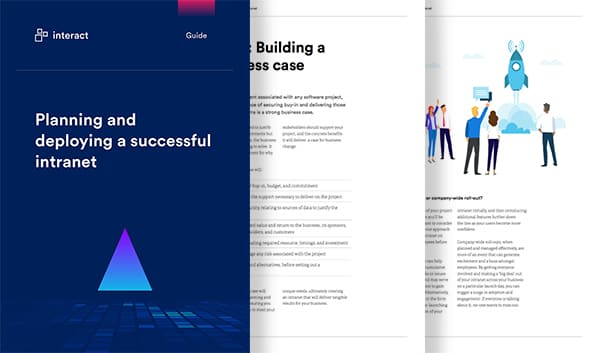When you’re busy looking after your employees, it’s all too easy to overlook your own needs. But with the repercussions of COVID-19 looking to continue well into next year, it’s high time that we prioritize the mental and emotional wellbeing of our internal communications practitioners.
Recently, Interact held a webinar to examine the current role of comms practitioners and the impact that this year has had on them. While there was widespread agreement that comms departments had never been busier – this year with its many demands had certainly seen high demand – it had all come at a cost.
As one of our audience reflected, “We’re busy trying to keep everyone’s spirits and morale up, but often there’s no-one to do that for us.”
It made us think: how do you ensure the well-being of a group of professionals who are working long hours maintaining everyone else’s?

Trends analyst, counselor, psychologist, cheerleader, data scientist, fact-checker… Internal communicators have worn a lot of hats since March 2020. The move to remote working under the shadow of the pandemic has expanded what’s expected of this department. While it’s been positive to see the profile of internal comms ascend, it has not been without its challenges.
In a Qualtrics study of more than 2,000 employees conducted at the end of March and early April 2020 in Australia, France, Germany, New Zealand, Singapore, the UK, and the US, two out of five (41.6%) respondents said that their mental health has declined since the COVID-19 outbreak. This has been a huge undertaking for those tasked with safeguarding employee well-being, and right now, communicators are working very hard to deliver for their employees. But at the same time, and on a more personal level, they’re also working out how they themselves navigate the long months ahead.
The spotlight on internal comms practitioners
The role of internal communications has been crucial in 2020. After all, this is the department that ensures that the business runs as smoothly as possible. With their input, collaboration, communication, and engagement are all possible: no mean feat considering the current environment isn’t exactly conducive to these aims. And at a time where morale is low, it is internal communications that are invigorating the employee experience.
Conversation, advice, guidance, suggestions, inspiration, help: internal communications are the heartbeat of our organizations. And in these uncertain times, it is essential we recognize the importance of the role they play – and in particular, the people behind them.
While IC experts work hard to protect employees’ safety and well-being during the crisis, it’s paramount that the communicator is also looked after and is enabled to take on the advice that they themselves prescribe.
The move to remote working under the shadow of the pandemic has expanded what’s expected of internal communications.
The workplace is beset with mental health challenges. Exhaustion, sadness, irritation, lack of focus, disturbed sleep: the effects of this year are manifesting themselves in a number of ways. Of course, this emotional downturn has a direct effect on work relationships, productivity, and efficiency.
So while communicators are working out strategies on employee engagement, working out ways to protect their welfare, and enhancing the remote working environment – there needs to be a helping hand guiding them too.
Communicating with staff during COVID-19
Mental health and internal communications
It’s critical that businesses understand the psychological impact this year has had on not only their employees – but those in charge of communications too.
The Institute of Internal Communication (IOIC) recently carried out a survey to look into the impact that COVID-19 was having on the working lives of internal communicators. Two-thirds of respondents said that organizational leaders were seeking their advice more, and 90% consider that the current situation would have a positive impact on the profession – including almost a third (32%) anticipating a “very positive” effect.
While very positive for the profile of internal communications, this increase in reliance and responsibility means that comms practitioners are experiencing increased pressure in their roles.
Communicators have been busy highlighting the importance of physical and mental health to their workforce this year. However, the survey shows that it is well-being which is taking a hit for many comms experts.
In the survey, respondents have singled out “significant increase to workload and capacity” as the top impact on their working lives. Close to fifty percent of those surveyed have disclosed their own concerns about an unsustainable workload, with some commenting, “Burnout while working more than full time at the strategic level and looking after a young family”; “Maintaining this intensity for too much longer – we are on our knees!”
The risk of burnout is clear. And internal communications will continue to face increasing challenges in this next phase of COVID. Businesses must re-adjust to not only meet what lies ahead but also take stock of the welfare of their people.
As one survey respondent says: “I’m working all hours because that’s what’s needed – I’m just worried that I won’t be able to sustain this in the medium and long term.” Work needs to be done now, in order to ensure long-term safety, happiness, and economic survival.
The role of internal communications has seen its profile ascend dramatically during the pandemic. The need for communicators has never been higher. But at what cost?
The conversation on mental health has ramped up significantly in 2020. Internal communicators have been keen to normalize talking about feelings of stress, anxiety, pressure, fear that have been prevalent recently. This will have been of huge benefit to the workforce who will have experienced more change in the past eleven months than they may have in their entire career.
But when you’re advising people on how to look after themselves – it’s necessary to make sure you’re looking after yourself. While you’re using effective internal comms to look after your workforce, how are you maintaining your own wellbeing?
In order to ready yourself for the next phase of the crisis, you don’t need to completely overhaul your working life. For most full-time professionals, effective change can come in the form of small, impactful adjustments.
1. Learn to say no

When you want to do the best job you can, we often say yes to everything. After all, we’re working as a team, we want to help, we don’t want to miss out on an opportunity. However, not saying no can be harmful. How else do you let people know you’ve reached your limit?
How can you prioritize work if you keep accepting more tasks on top? Saying no doesn’t imply weakness or strength of character. It shows that you’re in control, you’re accountable for the work you have, and are committed to providing quality over quantity.
2. Let off steam

Team-building gets a bad rap. It’s often associated with coercing colleagues into an activity that they may or may not find fun. However, during the restrictions imposed by the pandemic, we could all benefit from some time out with our teams.
Certainly, there have been some imaginative ideas that have sprang out from the past few months. Whether it’s a Slack channel dedicated to memes, house tours on Zoom, funny show-and-tells once a week – a place where you can be light-hearted and playful can be a great antidote to the general atmosphere of worry and fear.
Communicating with staff during COVID-19
3. Ask for help

Everyone needs a hand once in a while, and there’s no benefit in not asking for help when you need it. When you feel overwhelmed, reaching out to a colleague shows that you trust them enough to rely on them – it’s a good indicator of confidence
Most people have an innate desire to help, so when you put the call out, people respond willingly. Sharing tasks helps to bring teams closer together and understand the burden that you are under. There’s no point trying to carry on when you’re struggling, you and your work will only suffer as a result.
4. Set and keep boundaries

No one becomes more effective the longer the hours worked. This is why it is important to set boundaries on working hours, and let colleagues be vigilant of this. Breaks and lunch hours are essential and downtime to focus on a project is necessary. Using the tools and tech you use to communicate with others should have features to let your team know you need to be left alone during these times.
Everyone needs time to focus, so make sure you highlight this need to teammates, and encourage them to do the same.
5. Know your trigger points

Different people feel stress from different things. For example, a heavy workload can motivate some but overwhelm others. You might be feeling isolated, or be working in a hectic household. There might be too much team-time, or not enough contact with your colleagues. Too much noise, or not enough. Whatever it is, it’s important to know what your trigger points are.
There are ways of negotiating these stressors and to avoid letting them aggravate our working lives too much. Talking them through with your team and finding a balance in your workspace is vital to long-term satisfaction.
6. Keep talking

Many communicators have had to share news on redundancies and job cuts in their organizations. Whether it’s one-to-one or as a group, it’s essential you share what you are feeling with your teammates. You will all have common experiences, upsets, and concerns throughout this experience – which means you will benefit from a listening ear from someone who understands.
Many professionals have made sacrifices this year in order to keep up with the demand of their jobs. It’s time to take some time to offload and talk to others about how they are coping with the increase in responsibilities and the seemingly enduring nature of the virus and its impact.
7. Take a break

Many businesses have had to remind employees to take their annual leave. With travel restrictions and lockdown, there seemed to be little gain in booking time off. However, even if it is a duvet day, a chance to watch films with the family, or even catch up on odd jobs, a break from work is essential in refreshing the mind, body and soul.
As internal communicators, it’s important that you take time off for your own wellbeing. Your comms encourage workers to make full use of their paid vacation allowance and use the time however they wish, so do the same and draw a line under your work tasks, if only for a few days.
This year has been emotionally draining for everyone at every level. With no real end in sight of the current crisis, business should prioritize a culture of wellness for everyone, where time out, communication, boundaries and fun are accepted and encouraged.
In the early days of lockdown, employees bonded over a shared struggle and saw leaders being more transparent about their personal challenges. This openness needs to continue in order to ride out the crisis successfully. Recent reports from KPMG predicts that leaders who don’t put employee mental health at the forefront will see worse outcomes. As the situation continues, it’s important to keep repeating your message. But not only to your people, but to yourselves as well. Maintaining self-care is like the airplane advice: in the event of an emergency, put on your oxygen mask before you attend to anyone else. It’s critical that internal communicators and HR teams have the time, resources, and support to look after themselves in order that they can continue to build the culture needed to help everyone else.



